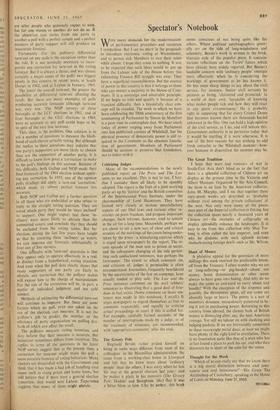Criticising Judges Many of the recommendations in the newly published
report on The Press and The Law seem to me excellent. This is not to say, I fear, that I consider them all likely to be speedily adopted. The report is the fruit of a joint working party set up by 'Justice' and the British committee of the International Press Institute, under the chairmanship of Lord Shawcross. They have looked very closely at various unsatisfactory aspects of our libel laws and various other re- straints on press freedom, and propose important changes. Such reforms, however, tend to remain in the air for a long time. Meanwhile, perhaps we are about to see a new sort of close and critical scrutiny of the workings of the courts being under- taken by the press- .a stimulating exercise which is urged upon newspapers by the report. The re- cent episode of the man sent to prison in secret, and the subsequent changing of the rule permit- ting such undisclosed sentences, was perhaps the forerunner. The extent to which comment on, and criticism of, judges is permissible is often misunderstood. Journalists, frequently bewildered by the uncertainties of the law on contempt, have usually tended to play safe. The Law and the Press instances comment on the mail robbers' sentences as illustrating that a good deal of free- dom in fact exists. (Some comment on those sen- tences was made in this notebook, I recall.) It urges newspapers to regard themselves as free to comment responsibly, and equally to criticise actual proceedings in court if this is called for. For example, carefully factual accounts of the number of interruptions made by a judge, or of the treatment of witnesses, are recommended, with 'appropriate comments' after the trial.






































 Previous page
Previous page